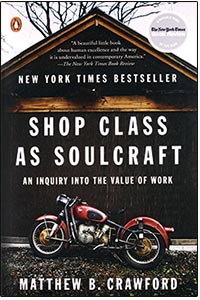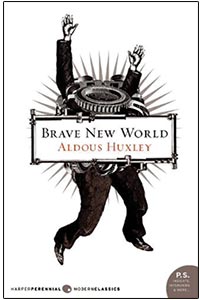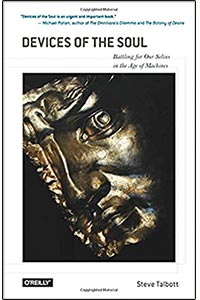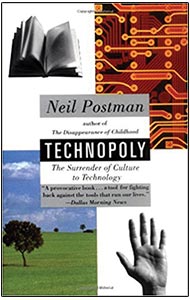Subtotal: $
Checkout-

The Gods of Progress
-

Anabaptist Technology
-

Your Neighbor Lives Next Door
-

Insight: Why I Am Not Going to Buy a Computer
-

The Perfect Tool
-

Endangered Habitat
-

The Pen and the Keyboard
-

Meet a True Story
-

A poem for my son about grace
-

Editors’ Picks Issue 15
-

The Soul of Work
-

Go On, Inner Man
-

Viktor Frankl
-

The Joys of Tech Asceticism
-

Readers Respond: Issue 15
-

Family and Friends
-

How to Homestead a Hermitage
-

Awake the Harp
-

The Ministry of Reconciliation
-

The Immortality Machine
-

The Immortality Delusion
-

Simulating Religion
-

Insight: Finding Someone to Worship
-

The Pencil Box
-

Why Children Need White Space
-

Insight: Friedrich Froebel
-

The Technology of Gender

Next Article:
Explore Other Articles:
Writers have long wrestled with the question of how the machines we shape in turn shape us. Since at least the nineteenth century, with its intense awareness of (and anxiety about) technological change, novels and works of nonfiction have attempted to grapple with the questions of how the technology we use influences us and how we can best understand and respond to its advances. Some of the most enduring of these books are below.

Matthew Crawford’s 2010 book, Shop Class as Soulcraft: An Inquiry into the Value of Work (Penguin Books) is in many ways a love letter to good technology. Crawford shows how working on motorcycles draws him out of his head – in fact, a follow-up book, also well worth your while, is called The World Beyond Your Head: On Becoming an Individual in an Age of Distraction – and embeds him in the physical world. He leads readers, even those who aren’t motorcycle aficionados, to see the tasks of engineering and repairing as deeply human endeavors, ones that break down the apparent gap between thinking and doing. To be able to repair is to have a kind of power, and a motorcycle mechanic has a very concrete role in a community, one that can’t be outsourced. Crawford’s arguments aren’t abstract: he makes them as he tells his own story. The book is a memoir as well as a reflection, and the author’s love for both the work he does and the people who’ve enabled him to do it are apparent on every page.

C. S. Lewis’s The Abolition of Man (HarperOne) is a short, sane, and shocking book. It’s about how children should be educated and how education differs from conditioning. It’s about morality and how to understand the idea that a moral world exists outside of human convenience and utility. But it’s also about technology. Absent an understanding of the Good, says Lewis, our power over nature through technology ultimately destroys everything that makes us distinctly human. We gain greater power with technological and biotechnological tools, but we believe ourselves, and nature, to be reduced to what those tools can manipulate. Finally, human beings cease to understand themselves as people: “They are not men at all: they are artifacts. Man’s final conquest has proved to be the abolition of man.”

Aldous Huxley’s classic dystopian novel Brave New World (Harper Perennial) is, in certain ways, the fictional working out of Lewis’s worst-case scenario. In the society it portrays, domination of the natural world and of the human self is near-complete. A futuristic society in which a commitment to the mass-production techniques of Henry Ford has replaced Christianity provides the backdrop for the struggles of those who haven’t entirely succumbed to the reshaping of the world. Bioengineering has separated society into castes, but there is no real social unrest, because all castes have access to drugs that simulate happiness. There is no romance or marriage, but there’s plenty of sex. With no challenges to overcome, there’s no possibility of failure. “A really efficient totalitarian state,” writes Huxley, “would be one in which a population of slaves…do not have to be coerced, because they love their servitude.” Against that servitude, Huxley’s novel stands as a call for vigilance.

Steve Talbott’s Devices of the Soul: Battling for Our Selves in the Age of Machines (O’Reilly Media) deserves to be better known. A series of essays covering many aspects of the human encounter with technology, this work is not technophobic – but it is profoundly cautious. Talbott brings a uniquely thoughtful approach to topics that range from the allure of modern hunting weapons for Amazon tribesmen to the impoverishment of education that results when computers are adopted as primary teaching tools, and from the perils of efficiency to Silicon Valley’s breathless paeans to the possibility of artificial consciousness. The influence of his interest in the work of Rudolf Steiner is apparent, but his reflections are interestingly congruent with those a Christian might make. Talbott urges us, above all, to be more thoughtful about our adoption of technology. “I don’t think modern technology necessarily alienates us from the world it mediates,” he says. “But a lot depends on our recognizing how it can do so.”

Neil Postman’s Technopoly: The Surrender of Culture to Technology (Vintage) is a new classic of techno-criticism, and the author’s trademark wit makes the book a pleasure to read. Technology, he emphasizes, is not a neutral tool to be used to further the goals of an existing culture; rather, it shapes a culture’s goals. The mechanical clock, for example, invented to keep track of the hours of prayer in Benedictine monasteries, shaped the way we perceive time and eventually allowed the birth of the highly organized factory system of production: “In the eternal struggle between God and Mammon, the clock quite unpredictably favored the latter.” The scientific revolution and especially the nineteenth century saw the birth of a culture of technocracy. More and more, the purpose of the world was to be found in applying increasingly elaborate technologies to the utilitarian solution of human problems. Contemporary America, Postman claims, is the world’s first technopoly – a totalitarian technocracy. His solution? Be a “loving resistance fighter.” Retain the humane and (though he is not a conventional believer) religious values that help us decide not just how to do something but what it is that we should do.
Already a subscriber? Sign in
Try 3 months of unlimited access. Start your FREE TRIAL today. Cancel anytime.




































